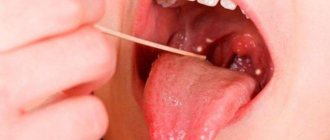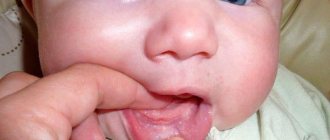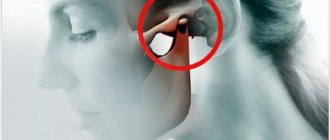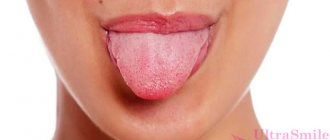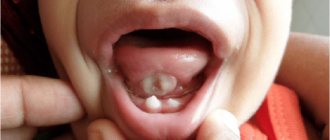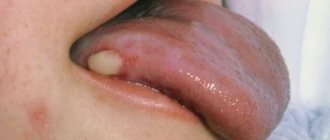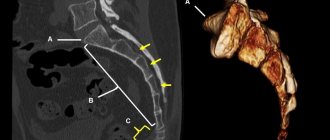We are used to the fact that we need to go to the dentist if we have problems with our teeth or gums. What to do if you have inflammation of the tongue or glossitis? Dentists identify more than 10 types and subtypes of infection. The infection can be caused by both fungus and bacteria. Viral infection is less common. Inflammation can be caused by a lack of certain vitamins and minerals, or hormonal changes. There are many reasons for the disease, so it is important to identify what exactly caused the inflammatory process.
Causes of glossitis
- improper oral hygiene;
- bacterial infection;
- fungal infection;
- heavy metal poisoning;
- bad habits (smoking, alcoholism);
- congenital pathologies of the tongue (folded tongue);
- allergic reaction;
- tongue injury (often caused by malocclusion);
- oral infections;
- lack of iron in the body;
- burn of the mucous membrane (hot food or drinks);
- infectious diseases (AIDS, tuberculosis, scarlet fever, measles).
Causes of pimples in the mouth
70% of red, white or pinkish rashes in the oral cavity, including on the tongue, indicate the presence of a serious dental disease. The asymptomatic course of the disease does not mean that the “trouble” will go away on its own. However, prescribing treatment on your own, guided by the advice of friends or recommendations from the Internet, is dangerous.
Important!
In principle, there cannot be acne on the tongue. Purulent skin rashes develop due to inflammation of the sebaceous glands, which are not present in the mouth. Accordingly, we call those pimples that appear in the oral cavity “pimples” by analogy. Just by external similarity.
There are several reasons for the appearance of irritations that visually resemble pimples:
- mechanical damage. A prick with a fish bone, a scratch, a burn from hot coffee can provoke a similar pathology;
- allergy. Not necessarily to foods; a seasonal allergic reaction is possible, manifesting itself in such an unusual way;
- viral and infectious diseases. Herpes, rubella, scarlet fever and ARVI sometimes manifest themselves as rashes in the mouth;
- fungal infection (candidiasis);
- stomatitis. Usually, with stomatitis, pimples first appear on the gums, but sometimes red spots with a whitish halo, which react sharply to touch or spicy/hot food, form over the entire lingual surface.
There is no point in waiting until diseases become chronic. In 98% of cases, such pathologies are treated quickly and inexpensively, if you do not neglect the condition and do not self-medicate.
The most common types of glossitis
The most common occurrences in dental practice are:
- acute catarrhal glossitis;
- tongue abscess;
- desquamative glossitis.
Acute catarrhal glossitis is the most common type of inflammation. Inflammation can be caused by microbes or mechanical damage to the tongue. The predominant symptoms are pain, redness and swelling.
A tongue abscess is the appearance of an abscess in the tongue. The abscess can be superficial, under the mucous membrane, or maybe in the thickness of the tongue. Abscesses in the thickness of the tongue, in addition to pain in the tongue, can cause a disturbance in the general condition. A person develops a fever, a headache, and weakness. Most often occurs due to injury to the tongue.
Desquamative glossitis, also known as “geographic tongue,” most often appears in children. It appears in the form of various spots on the tongue, which look like a white coating, alternating with areas of pink mucous membrane. There are no changes other than appearance. Scientists have identified a clear reason for it. The main factors are believed to be bacteria, allergic reactions and hormonal imbalances.
Complications of urticaria
It is important to know what hives look like and to be able to provide first aid correctly.
This will help prevent the development of severe complications that can lead to death. Often urticaria is accompanied by Quincke's edema, which is also called angioedema. Its development in the larynx area is especially dangerous, as it can compress the trachea and impair breathing.
Another serious complication is anaphylactic shock. This is a life-threatening immediate allergic reaction that occurs when the human body is hypersensitive to a particular allergen. Usually develops upon repeated contact with the allergen and requires immediate medical attention.
Symptoms of glossitis
- increased salivation;
- swelling and redness;
- pain and burning when eating;
- plaque on the tongue in the form of spots;
- bad breath;
- papillomas or warts on the tongue;
- speech disorder;
- foreign body sensation.
Prevention of glossitis - high-quality oral hygiene and no bad habits. It is important to undergo timely preventive examinations and also eat well. All these factors actively contribute to the development of the disease and bring a number of problems.
First aid for hives
It is important that you always have allergy medications in your home medicine cabinet, since urticaria in adults, and in children too, can appear at any time.
Allergy medications can be in the form of drops or tablets. Modern remedies do not cause drowsiness and have virtually no side effects. Doctors recommend having in your home medicine cabinet to eliminate urticaria and itching, Fenistil drops, which can be used from childhood, Erius tablets, which have a long-lasting antihistamine effect after administration, Loratadine, which helps cope with Quincke's edema, which often accompanies urticaria.
It is important to take the medicine at the first symptoms, without waiting for the general condition to worsen. If after 20 minutes from the moment of administration there is no improvement, you should call an ambulance.
Treatment of glossitis
A specialist must make an accurate diagnosis and identify the cause of the disease. If you suspect that you have glossitis , and all symptoms indicate this, contact your dental clinic. This is the only way to create the right treatment plan and provide timely assistance. Quite often in such cases, doctors prescribe antibiotics, anti-inflammatory drugs and rinsing the mouth with special antiseptic solutions. In advanced stages, glossitis is treated surgically. Deep abscesses must be opened in the maxillofacial department. Under no circumstances should you take medications without a doctor’s recommendation.
You can cure glossitis, caries or any other diseases of the oral cavity right in your sleep. Family Dentistry Center "Medexpert" provides dental treatment under medicinal sedation. Thanks to this approach, the patient falls into a healthy sleep, ceases to feel pain and discomfort, while the vital functions of the body remain unchanged. Sedation is widely used in pediatric dentistry and even helps fight dental phobia. Dental treatment can be comfortable and painless - tested for yourself.
Treatment of urticaria
The only way to get rid of the disease is to avoid contact with the allergen, which is previously detected by laboratory tests.
If testing does not reveal a provoking factor, and the urticaria is episodic, then taking antihistamines will quickly eliminate the symptoms. During treatment, it is recommended to follow a diet that, in case of urticaria, will help prevent the recurrence of the disease. The menu should include only hypoallergenic products: lean boiled meat, soups with recycled meat broth or vegetarian. It is better to choose rice, buckwheat, and oatmeal from cereals. Low-fat cottage cheese, natural yogurt, apples, dried fruit compote, excluding raisins, and whole grain bread are recommended.
Citrus fruits, nuts, fish and all seafood, chocolate products, smoked meats, coffee, eggs, honey, and store-bought baked goods should be excluded from the menu during treatment.
Treatment is carried out by a dermatologist and an allergist-immunologist. For topical application, ointments for urticaria are effective; they not only relieve itching, but also eliminate swelling, redness and a burning sensation on the skin. One of the most effective is Dimetinden gel, which must be applied in a thin layer to the affected area of the skin up to 4 times a day.
A course of antihistamines is prescribed in the form of tablets. Your doctor may also prescribe calcium gluconate or calcium chloride for urticaria. They help reduce the symptoms of allergies, but they should only be administered under the supervision of a doctor in the treatment room.
If antihistamines do not provide the desired effect quickly, or for severe forms of hives, corticosteroids are used, which can be applied to the skin or taken in the form of tablets or injections.
Pimples on tongue
Pimples on the tongue are painful and cause discomfort, but they are easily treated and do not cause complications. A pimple on the tongue can appear for many reasons, most often due to microtrauma of the tongue, stomatitis or herpes. In principle, there cannot be acne on the tongue, since there are no sebaceous glands on it. Those formations that are mistaken for pimples are not actually pimples - they are not filled with purulent exudate. These are small swellings and ulcers on the surface of the tongue. They are white, pink, red, yellow, depending on the complexity of the disease and the cause of formation. Small pimples are very painful, they interfere with eating, talking and even bother the patient at rest.
White pimple on tongue
A white pimple on the tongue most often appears as a result of stomatitis or candidiasis. These two diseases are treated completely differently; you should consult a doctor at the first symptoms in order to correctly diagnose and prescribe treatment. Candidiasis is characterized by white pimples and a coating on the tongue, which in appearance resembles cottage cheese and covers the entire surface of the oral cavity. There are also white pimples on the base, tip and under the tongue.
With stomatitis, small pimples appear on the tongue. There are usually many of them, they can merge with each other. These small white pimples at the tip or root, at the base or underneath are very painful and itchy. The pain intensifies after eating. If such symptoms appear, you should consult a doctor to confirm the diagnosis and prescribe treatment. Treatment consists of antiseptic treatment of the surface of the oral cavity and lifestyle correction, since the main cause of stomatitis is insufficient oral hygiene.
Red pimple on tongue
Red pimples on the tongue are the main sign of glossitis, an inflammatory disease. Outwardly, they look like inflamed red dots that hurt.
Glossitis can appear for many reasons:
- Allergic reaction;
- alcohol abuse;
- eating too hot and spicy food;
- the presence of the herpes virus.
The appearance of yellow pimples on the tongue is usually not an independent disease. Often with stomatitis or candidiasis, the coating on the surface of the tongue takes on a yellowish rather than white tint. Yellow pimples most often also mean either candidiasis or stomatitis.
Pink pimples on the tongue , like yellow ones, are not an independent disease. Usually they are an early stage of glossitis, when the inflammatory process has not yet reached its peak. If pink acne appears, you should immediately consult a doctor for advice.
The main causes of acne:
Mechanical damage
In the process of chewing or biting food, we bite our tongue, resulting in a slight mechanical injury. The risk of surface damage increases when consuming hard foods with sharp edges (crackers, chips, seeds). A small painful swelling or bump forms at the site of the injury, which after some time turns into a white pimple.
You should exclude spicy and hot foods from your diet, carefully monitor oral hygiene, and after a few days the pimple will disappear on its own.
Allergic reaction
An allergic reaction is possible to food, medicine or toothpaste. This causes small white pimples and sores to form that hurt and irritate when eating or drinking liquids. If your doctor suspects an allergy, it is very important to identify the allergen and eliminate it from your diet.
Stomatitis
Stomatitis is a common cause of white or red pimples on the surface of the tongue. The main cause of stomatitis is insufficient oral hygiene, exposure to pathogenic bacteria on the mucous membranes due to dirty hands, unwashed fruits and vegetables. Most often, children suffer from stomatitis, because they tend to put everything in their mouth. At the first suspicion of stomatitis, you should consult a doctor, he will prescribe medications that relieve itching and soreness of the tongue, as well as promote the speedy healing of ulcers and pimples.
Herpes
Herpes can affect all mucous surfaces of the human body, including the oral cavity. In this case, watery pimples may appear on the tongue and inner surface of the cheeks. Without proper treatment, herpes can eventually affect the entire body, including the brain. Therefore, if you have a herpes virus, you should consult a doctor and undergo a course of antiherpetic therapy.
Poor nutrition
If you eat too much spicy and hot food, inflammation of the tongue, or glossitis, may occur. Drinking alcohol in large quantities, as well as smoking, can cause inflammation of the tongue. Therefore, when the first problems appear, you should immediately try to get rid of bad habits.
Pathologies of the patient's internal organs
Pimples on the tongue can be a manifestation of various diseases, including candidiasis or tuberculosis. If a pimple does not go away for a long time, be sure to consult a doctor.
Weakened immunity
If the immune system is weakened as a result of a previous illness or due to a lack of vitamins and microelements, small painful pimples may appear on the surface of the tongue. It is necessary to take immunomodulators, as well as drugs with lactobacilli to normalize intestinal function and correct the activity of the immune system.
You can only get rid of a pimple on your tongue using comprehensive measures. It is necessary to consult a doctor to determine the true cause of its occurrence. The oral cavity should be kept clean, preferably rinsed with a soda solution or a decoction of St. John's wort. It is also necessary to strengthen the immune system and limit the consumption of spicy and too hot foods so as not to irritate the inflamed nodule.
A pimple at the base of the tongue makes it difficult to swallow and even talk; it hurts and causes a lot of trouble. It could be stomatitis, a fungal infection, a sore throat or pharyngitis. Only an experienced doctor can make a correct diagnosis.
A pimple on the tip of the tongue can pop up at the site of a microtrauma as a result of an infection entering the wound.
In any case, it is advisable to consult a doctor and get tested to make an accurate diagnosis.
For any questions, please call: +7 (343) 2000 730; +7 We work daily, without breaks: Mon-Sat 09.00-21.00 Sun 10.00-20.00 We are waiting for you at the address: Ekaterinburg, st. Gottwald 14a, office 6. Dentistry "MK DENT"

